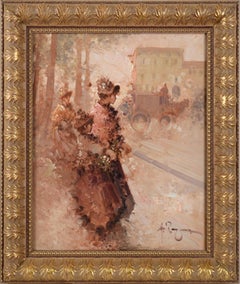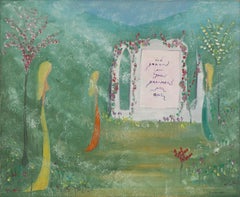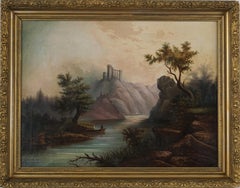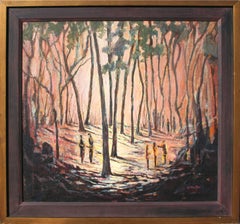Want more images or videos?
Request additional images or videos from the seller
1 of 7
Helene Minelli "The Weaver" - Large Scale Navajo Figurative Landscape1980
1980
Price:$2,750
About the Item
- Creator:Helene Minelli (1918 - 2010)
- Creation Year:1980
- Dimensions:Height: 74 in (187.96 cm)Width: 82 in (208.28 cm)Depth: 2 in (5.08 cm)
- Medium:
- Movement & Style:
- Period:
- Condition:Painting has a canvas backing which is painted black on verso.
- Gallery Location:Soquel, CA
- Reference Number:Seller: JT-D5153*1stDibs: LU5423387671
About the Seller
5.0
Platinum Seller
Premium sellers with a 4.7+ rating and 24-hour response times
Established in 1986
1stDibs seller since 2014
3,043 sales on 1stDibs
Authenticity Guarantee
In the unlikely event there’s an issue with an item’s authenticity, contact us within 1 year for a full refund. DetailsMoney-Back Guarantee
If your item is not as described, is damaged in transit, or does not arrive, contact us within 7 days for a full refund. Details24-Hour Cancellation
You have a 24-hour grace period in which to reconsider your purchase, with no questions asked.Vetted Professional Sellers
Our world-class sellers must adhere to strict standards for service and quality, maintaining the integrity of our listings.Price-Match Guarantee
If you find that a seller listed the same item for a lower price elsewhere, we’ll match it.Trusted Global Delivery
Our best-in-class carrier network provides specialized shipping options worldwide, including custom delivery.You May Also Like
‘Near Sutton, Surrey’ stream and old cottage, 19th C/early 20th C oil on canvas
By Abraham Hulk the Younger
Located in Hillsborough, NC
Dutch/English artist Abraham Hulk the Younger (1851-1922) is most known for landscapes of the British countryside. This work is one of a pair (the second work is also available by s...
Category
Late 19th Century Old Masters Landscape Paintings
Materials
Canvas, Oil
$2,800
H 27 in W 22.75 in D 2.13 in
Peasants in a Cornfield (Boer in het veld) by David Teniers the Younger
By David Teniers the Younger
Located in Stockholm, SE
Remembering the magic of everyday life moments in the art of David Teniers:
The art of David Teniers the Younger (1610–1690) coincided with the heyday of the Flemish Baroque and captured a great variety of motifs of his time. In this painting of a seemingly simple peasant scene lies keys to understanding both the imaginative mind of Teniers as well as why this time period produced some of the most iconic works in all of art history.
As indicated by the name, Teniers was more or less born into his profession. As the son of David Teniers the elder, himself a painter who studied under Rubens, the younger David received training in art from a very young age and had no less than three brothers who also became painters. Because of his father’s frequent financial failures that even at times saw him imprisoned, David the younger helped to rescue the family from ruin through painting copies of old masters. Essentially, the young Teniers was confronted with painting as both a passion and creative expression as well as a necessity during difficult times, an experience that would shape much of his capacity and sensitivity in his coming life.
Despite the hardships, the talent and determination of Teniers was recognized and quickly expanded his possibilities. He had already spent time in France and possibly also England when he was hired by his father’s former teacher Rubens to help with a prestigious commission with mythological paintings, now considered lost, for Philip IV the king Spain. In 1644–54 Teniers was appointed dean of the Antwerp Guild of Saint Luke, manifesting his esteemed position within the artistic community. A few years afterwards he took an important step when relocating to Brussels, where Teniers yet again found new career opportunities that would prove to be very successful.
As the keeper of the collections of Archduke Leopold Wilhelm, a role similar to what we now refer to as an art advisor, Teniers purchased hundreds of important artworks that manifested the prominent status of the Archduke’s collection while at the same time providing an unusual access to inspiration and knowledge for Teniers himself. Since he kept on painting during the same time, his creative scope must have seemed almost bewildering in the great variety of images and stories that he surrounded himself with.
Regardless of how glamorous and culturally stimulating the career of Teniers was, he was as open to the charm and existential importance of everyday life as he was to works of great masters and luxurious collectibles. In his impressive repertoire of genres with everything from exquisite royal portraits, interiors, landscapes and history paintings he always added something new and inventive, highlighting the possibilities of art and importance of an experimental and intuitive mind. It is difficult to single out one aspect or genre to summarize his legacy, since it lies much more in the broad virtuosity across many motifs, although he is particularly remembered for farm scenes and meticulously depicted interiors where other paintings and artworks are captured with an astonishing precision. However, the fact that he is still today one of the most known and celebrated names of the Dutch Golden Age is a proof to the magic of his work, which continues to spark dialogue and wonder in the contemporary viewer of his works.
The farm boy in the field in this painting, which likely dates to the mature part of his career, is a wonderful entry into the mind of Teniers. In the tightly cropped motif, we see him standing right in the middle of the busy harvest when men, women and everyone capable were sent out in the field to collect the crop that formed the very core of their diet and survival. In the background we see a fresh blue sky interspersed with skillfully painted clouds, some trees reaching their autumnal colours and in the far distance the glimpse of a small church and village. The presence of a church in a landscape, so typical of Dutch art, served both a symbolic and visual function as a representation of faith while at the same time defining scale and distance.
In the field, the work is in full action with the farmers spread out in various positions, all in the midst of hard and sweaty labour. While they are portrayed as having nothing else than the work on their mind, our farm boy seems to have his attention directed elsewhere. Standing there with his white, half open shirt, flowy curls and strong, sturdy body; his gaze is directed away, out of the picture and the scythes in his hands. He looks almost smirking, expressed with tremendous subtlety in the slight smile of his lips and big eyes, being just in the middle of losing focus on the work. What is it that steals his attention? What has he seen, or realized, or felt – to break him free of the arduous task of harvesting, if but for a moment?
Here starts the wondering and the questions that are the hallmark of a great piece of art. Instead of explicitly locking in the motif in overly clear symbolism Teniers has chosen an open ended, subtle yet striking moment for us to consider. While it of course can be related to numerous other farm scene depictions of this time, and clever usages of gazes and real-life scenes to underscore various moral or symbolic meanings, the painting can be much more of a contemplation than an explanation or illustration. The ordinary nature and understated yet emotionally textured composition of the motif gives greater space for our own reactions and thoughts. Has he seen a pretty farm girl just passing by? Is he fed up with the farm life, joyously dreaming away for a minute, imagining another future? Or is he simply in need of distraction, looking away and ready for anything that can steal his attention?
One quality that never seem to have escaped Teniers was that of curiosity. During all of his career he constantly investigated, expanded and experimented with not only the style and technique of painting, but with the vision of art itself. Being credited with more or less introducing farm motifs for a broader audience not only tells us of his ability to understand the demand for different motifs, but the sensitivity to transform seemingly ordinary parts of life into deep aesthetic experiences, far beyond their expected reach. The farm boy in this painting is, of course, exactly that. But with the help of one smirk the entire picture is charged with a different energy, awakening many contrasts and relationships between the calm landscape, the hard work and his own breach of effectivity, holding sharp scythes while thinking or seeing something else.
It is no wonder Teniers chose to work with farm scenes as a way of investigating these intricate and delicate plays on expectations and surprises, clarity and ambivalence. It invites us to an appreciation of human everyday life that connects us with the people of 17th century...
Category
Late 17th Century Old Masters Landscape Paintings
Materials
Canvas, Oil
$28,203
Free Shipping
H 12.6 in W 10.04 in
Fine 18th Century Italian Old Master Oil Painting Berghers with Animals Sunset
Located in Cirencester, Gloucestershire
The Close of Day
Italian School, early 18th century
oil on canvas, unframed
canvas: 17 x 22.5 inches
provenance: private collection, France
condition: very good and sound condition
Category
18th Century Old Masters Landscape Paintings
Materials
Oil, Canvas
$2,759 Sale Price
30% Off
H 17 in W 22.5 in
FINE 17th CENTURY ITALIAN OLD MASTER OIL PAINTING - FIGURES GARDENING LANDSCAPE
Located in Cirencester, Gloucestershire
"The Working Landscape"
Italian School, 17th century
oil painting on canvas, framed
canvas: 42.5cm x 60cm
framed: 50.5cm x 68cm
Fine quality Italian Old Master oil painting on can...
Category
Mid-17th Century Old Masters Landscape Paintings
Materials
Canvas, Oil
$6,922 Sale Price
30% Off
H 19.89 in W 26.78 in D 1.97 in
Antique Roman painter - 18th century landscape painting - Wanderers - Italy
Located in Varmo, IT
Roman painter (18th century) - Landscape with Wayfarers.
43.5 x 34.5 cm unframed, 58.5 x 49.5 cm with frame.
Ancient oil painting on canvas, in a carved and gilded wooden frame (no...
Category
Early 18th Century Old Masters Figurative Paintings
Materials
Canvas, Oil
$1,175 Sale Price
44% Off
H 23.04 in W 19.49 in
A 17th c. Italian school, Capriccio with the Colosseum, circle of V. Codazzi
Located in PARIS, FR
A capriccio with the Colosseum in Roma
17th century Italian school
Circle of Viviano Codazzi (1604-1670)
Oil on canvas
Dimensions: h. 35.43 in, w. 51.18 in
Modern 17th century style ...
Category
17th Century Old Masters Landscape Paintings
Materials
Canvas, Oil
$12,809
H 40.94 in W 57.09 in
Figures Chatting outside Village Tavern in Mountain Landscape, Period Oil
By 19th century Dutch or Flemish school
Located in Cirencester, Gloucestershire
Dutch/ Flemish School, early 1800's
oil on canvas, framed
framed: 19 x 24 inches
canvas: 13.5 x 18.5 inches
provenance: private collection, France
condition: good and sound condition...
Category
Early 19th Century Old Masters Landscape Paintings
Materials
Oil, Canvas
$1,211 Sale Price
30% Off
H 19 in W 24 in
Large 18th Century English Old Master Oil Painting Portrait of Lady on canvas
Located in Cirencester, Gloucestershire
Portrait of a Lady
English School, 18th century
oil on canvas, unframed
canvas : 31 x 25 inches
provenance: private collection, UK
condition: good and sound condition
Category
Early 18th Century Old Masters Landscape Paintings
Materials
Oil, Canvas
$1,403 Sale Price
30% Off
H 31 in W 25 in
Early 1800's English Oil Painting Figure in Rural Woodland Landscape, original
By circle of John Constable
Located in Cirencester, Gloucestershire
Artist: English School, early 1800's, circle of John Constable (British 1776-1837)
Title: The Woodland Path
Medium: oil on canvas, framed, unsigned
Size: 12 x 22 inches
Picture: 9 x 18 inches
Provence: from a private collection in East Anglia...
Category
Early 19th Century Old Masters Landscape Paintings
Materials
Canvas, Oil
$3,180 Sale Price
30% Off
H 12 in W 22 in D 1 in
Huge I1600's Italian Old Master Oil on Canvas Jesus at House of Mary & Martha
Located in Cirencester, Gloucestershire
Jesus at the House of Mary & Martha
Italian artist, 1600's
oil on canvas, unframed
Canvas: 32.5 x 56.5 inches
Provenance: Private collection, England
Condition: for a work of such mo...
Category
17th Century Old Masters Figurative Paintings
Materials
Oil, Canvas
$7,202 Sale Price
30% Off
H 32.5 in W 56.5 in
More From This Seller
View AllFrench Ladies on the Boulevard - Figurative Landscape
Located in Soquel, CA
Softly rendered European street scene by an unknown artist (20th Century). A group of well-dressed women are standing at the side of the road, near some trees. To the right and in the background, a horse an carriage is passing by. The scene is executed with small, circular strokes, giving the piece a soft yet dynamic feel.
Signed in the lower right corner.
Presented in an ornate gilded frame...
Category
Late 20th Century English School Landscape Paintings
Materials
Canvas, Oil, Stretcher Bars
Mid Century Modern Surrealist Hawaiian Visionary Art - The Dream & the Dreamers
By Marguerite Blasingame
Located in Soquel, CA
Symbolic and surreal landscape with three women in a mystical garden setting walking toward a plaque "The dream and the dreamer are one" by Marguerite Louis Blasingame (American; 1906-1947), circa 1940-45. Unique painting with dream-like quality with three blonde figures looking at a garden folly...
Category
1940s Futurist Figurative Paintings
Materials
Canvas, Oil, Stretcher Bars
19th Century Original Scottish Loch Painting in the style of Alexander Nasmyth
Located in Soquel, CA
Mid 19th Century Original Oil Painting of Fishing on Scottish Loch in the Style of Alexander Nasmyth
Gorgeous 19th Century landscape painting of a Scottish loch with fisherman and castle ruins in the style of Alexander Nasmyth (Scottish, 1758 - 1840). This painting features the rough-hewned nature of Scotland's landscape while juxtaposing the peacefulness of a fisherman casting his line into the loch. Adding interest is the castle ruins on the cliff's edge with a sailboat beneath. There is something new to see with each viewing of this picture.
Signed: Illegible monogram lower left corner. (See image)
Framed: Presented in rustic giltwood frame of the period.
Condition: Good
Canvas size: 18"H x 24"W.
Framed Size: 22"H x 28"W x 3"D
Alexander Nasmyth was a painter, illustrator, landscape gardener and engineer. Alexander Nasmyth's style appears to have been molded principally on that of Claude Lorrain in arrangement, color and mood, and on Jacob van Ruysdael...
Category
1860s Impressionist Landscape Paintings
Materials
Canvas, Oil, Stretcher Bars
Mid Century Figurative Landscape -- The Search
By Winifred Lucy Shaffer
Located in Soquel, CA
Mid Century Figurative Landscape - The Search
A dreamlike landscape by Winifred Lucy Shaffer (American, 20th Century). Several figures are clustered together in a forest setting. Th...
Category
1960s Modern Figurative Paintings
Materials
Canvas, Oil, Stretcher Bars
$1,204 Sale Price
20% Off
Mid Century Original Spanish Impressionist Fishing Village
Located in Soquel, CA
Mid Century Original Spanish Impressionist Fishing Village Scene with Figures
Spanish impressionist oil painting by A. Boneto (Spanish, 20th Century), circa 196Painterly impression...
Category
1960s Impressionist Landscape Paintings
Materials
Canvas, Oil, Stretcher Bars
Coastal Countryside Scene with Horse-Drawn Cart - Antique Original Oil Painting
Located in Soquel, CA
Coastal Countryside Scene with Horse-Drawn Cart - Antique Original Oil Painting
Early 20th century oil painting of a countryside scene, potentially the British Isles. In the foregro...
Category
Early 20th Century Realist Landscape Paintings
Materials
Canvas, Oil, Stretcher Bars
Recently Viewed
View AllMore Ways To Browse
Painting Of Native American
Helene Minelli
Triptych Trees
Tugboat Painting
Ukrainian Landscape Paintings
Van Gogh Starry Night
Victorian Thames Painting
Vietnamese Oil Painting
W Richards
Whisky Paintings
William Meadows
Winter Landscapes Russian
18th Century British Landscapes
Alfred Mitchell
Antique Airship
Boat Dock In Art
Boat Shed
Bridge Of Sighs



